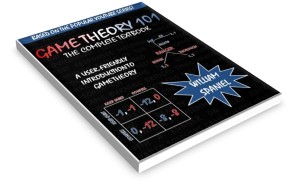The previous lecture introduced the folk theorem, which showed that the set of equilibria to infinite horizon games is very large. This lecture explains some of the problems that come with that finding.
Takeaway Points
- People use game theory for two main purposes. From the prescriptive perspective, game theory can give recommendations of what people should do. From a descriptive perspective, it explains and predicts why actors engage in particular behaviors. The folk theorem creates a significant problem for the latter.
- Consider any finite stream of outcomes. For a sufficiently high δ, those outcomes occur in a subgame perfect equilibrium.
- For example, consider the outcome of a prisoner’s dilemma where one player defects and the other cooperates. Despite the cooperator receiving the sucker’s payoff, equilibria exist where that player suffers the sucker’s payoff for any n number of periods consecutively.
- As long as the players are patient enough, they are willing to suffer a very long stream of bad payoffs to preserve cooperation for the rest of time. Thus, in the above example, the player suffers the sucker’s payoff for n periods because they will receive the cooperation payoff for the rest of time if they follow that set of strategies. If they deviate, this can set off a trigger strategy that forces the player to receive a mutual defection payoff for the rest of the time. The sufficiently great patience of the player means that he prefers waiting for the cooperation to eventually arrive, even if it means great pain in the interim.
- If the purpose of equilibrium is to predict or explain outcomes, subgame perfect equilibrium predicts and explains everything. But that gives it very little predictive power.
- In practice, actors are not always that patient. There are also heuristics that suggest favoring some equilibria over others. But these are value judgments from the person working on the model and not something that subgame perfect equilibrium itself dictates.

